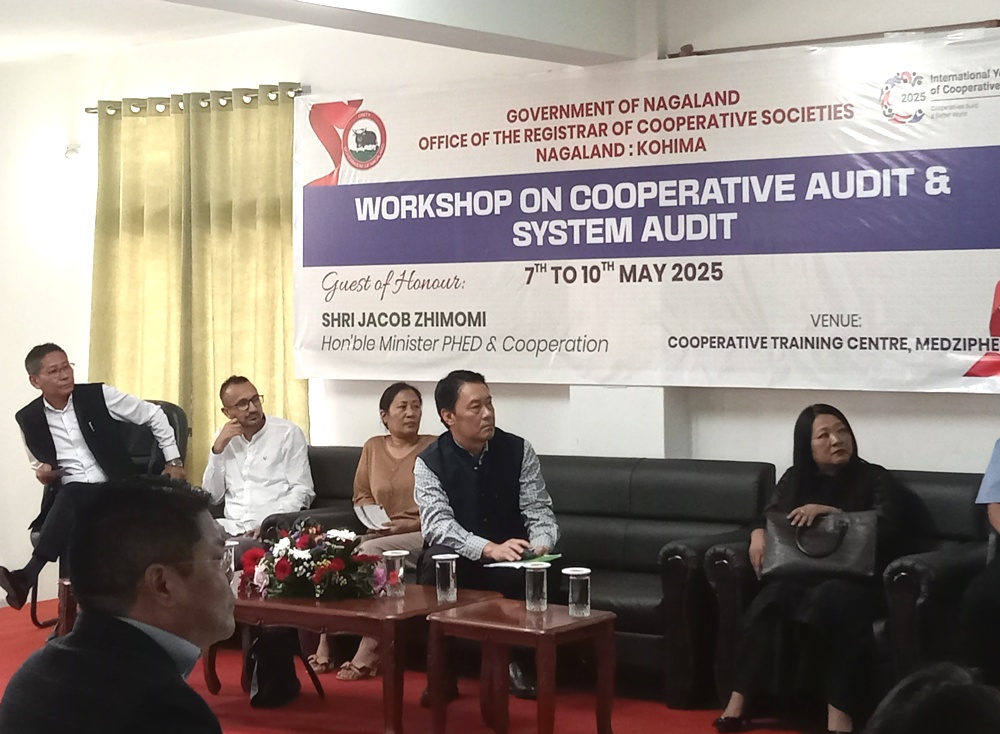SATURDAY, JUNE 14, 2025
- Home
- Nagaland cooperative societies plagued by dormancy, says Commissioner
Nagaland cooperative societies plagued by dormancy, says Commissioner
Published on May 7, 2025
Share
-

Zarenthung Ezung launching the Multipurpose Primary Agricultural Cooperative Societies (MPACS) video on Wednesday in Medziphema.
- DIMAPUR — The cooperative society sector in Nagaland is facing challenges, with a large majority of registered societies failing to function effectively, according to Zarenthung Ezung, Commissioner & Secretary of Cooperation department.
- Speaking at the inaugural programme of a workshop on cooperative audit and system audit held at the Cooperative Training Centre in Medziphema on Wednesday, Ezung revealed that of the over 8,000 registered cooperative societies in the state, a staggering 80% are currently dormant.
- Underscoring the detrimental impact these inactive societies have on the department's reputation, he urged the department to take decisive action, including the cancellation of registration for dormant or non-functional cooperatives.
- Ezung affirmed that a meeting with the Registrar of Cooperative Societies (RCS) will be convened shortly to address this issue.
- On auditing and accountancy, he acknowledged the common difficulty many Nagas face with mathematics and reminded the department of its crucial role as the auditor of the state. He urged officials to work diligently and not underperform.
- “Make use of this workshop to upgrade and update your knowledge and skill and take this issue seriously," he advised.
- The Commissioner & Secretary also expressed concern over the slow progress of the digitalisation project for 231 Primary Agriculture Credit Cooperative Societies (PACS).
- He said that the department is behind schedule and the current progress is not satisfactory. "If we cannot digitalise even the 231 PACS for a small state like Nagaland, what can we expect from the government of India? If we fail this, we have failed everything," he asserted, stressing the importance of prioritising the digitalisation initiative.
Also read: Deputy CM TR Zeliang pushes for adoption of National Highways Act
- Ezung requested the RCS office to hold review meetings at the directorate level every two weeks or once a month to monitor progress and address challenges effectively.
- The inaugural event also saw the launch of an educational video on Multipurpose Primary Agricultural Cooperative Societies (MPACS), produced by Dreamz Unlimited.
- The video, which runs for 14 minutes and 23 seconds, is an initiative of the department of Cooperation and NABARD RO Dimapur.
- MPACS, as explained by the department, are grassroots-level cooperative institutions in rural India that offer a wide range of services to farmers and rural communities.
- Unlike traditional PACS, which primarily provide short-term agricultural credit, MPACS serve as integrated rural support centres. They offer credit facilities, supply essential farm inputs like seeds, fertilisers, and pesticides, provide storage solutions, rent out farm equipment, and assist in the procurement and marketing of agricultural produce.
- In some cases, they also extend non-farm credit and facilitate access to banking and insurance services. Owned and managed by local members, mainly farmers, MPACS operates under the State Cooperative Societies Acts within the three-tier cooperative credit structure that includes District Central Cooperative Banks and State Cooperative Banks.

